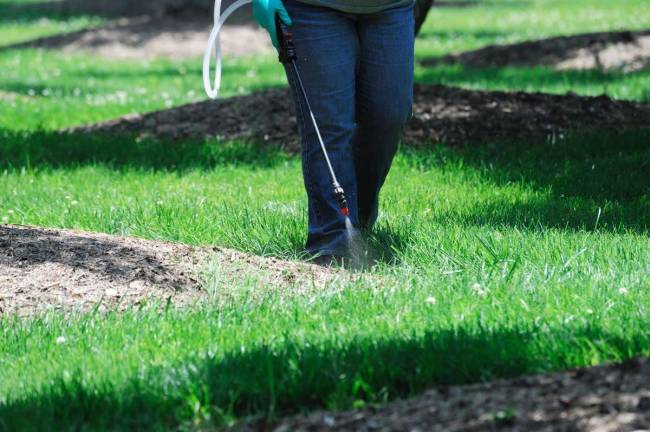BY ANN GENADER
WEST MILFORD — Passaic County officials have some studying to do after receiving a thick packet of information on the use of chemicals to eliminate high grass and weeds along the county roads in West Milford.
All the information received from various sources was sent to the county by West Milford Administrator Antoinette Battaglia.
In July, after residents raised health concerns over using chemicals, West Milford officials asked the county to cease spraying and to return to mowing. The county responded that spraying is a cost-effective and efficient way to handle the grass and weed issue.
“Township officials appreciate the services provided by Passaic County and, as fiscally responsible public servants, we also recognize the financial expediency of instituting cost-saving measures to provide services,” Battaglia said in a letter seeking input from environmental groups and sources. “Nonetheless, we are cognizant of the need to strike a balance between providing cost-effective services and preserving the quality of life for our residents which includes preserving our environment and the natural resources that are so abundant in West Milford.”
Passaic River Coalition Executive Director Laurie Howard said her group supports West Milford’s asking the county to stop using chemicals. She wrote in August that The International Agency of Research on Cancer and the United World Health Organization’s research indicates that the use of certain chemicals have been linked to cancer. Howard said using chemicals to kill roadside vegetation is an egregious mistake and puts the environment at risk.
The West Milford Environmental Commission wants to know if the chemicals being used on roads in the upper municipalities is also being used down county on roads such as Hamburg Turnpike. It asked what the rationale was for Passaic County to choose to use chemicals in an environmentally sensitive Highlands Preservation Area when it did not appear that the roads in the more developed municipalities in the lower part of the county were being sprayed.
The commission said chemicals should only be applied according to manufacturer’s directions and not during windy conditions and the county should verify they are utilizing the correct equipment and application techniques and must follow manufacturer’s recommendations for storing the chemicals and cleaning the equipment.
Posting signs and notice of spraying was suggested. Commissioners noted there is an aesthetic downside to spraying because weeds dry up and wither.
The Association of New Jersey Environmental Commissions said areas of concern regarding the type of chemical used include runoff, erosion, water contamination, depletion of native vegetation and habitat loss.
The response said once the chemical enters a water system it does not break down quickly, binds tightly to soil and can persist in it up to six months depending on the climate and type of soil. In the Newark Watershed, ANJEC said that using chemicals can have a negative impact on water supplies, as well as native vegetation and wildlife.
Paul Zerrillo, co-chair of the Greenwood Lake Commission, said the commission doesn’t have expertise in this area but they have been led to believe that chemicals are not harmful in this particular application.
Zerrillo added that he is doing more research.
Chief Michael McConville of the state’s Department of Environmental Protection said it does not provide specific commentary on the pros or cons of different weed removal methods.
He did say that, in general, they always advise using best management practices when applying any chemical.
McConville said only a properly licensed operator should use the product and label directions must be strictly followed.
The New Jersey Highlands Water Protection and Planning Council responded their staff does not have the expertise to comment regarding the use of chemicals for roadside vegetation control.
